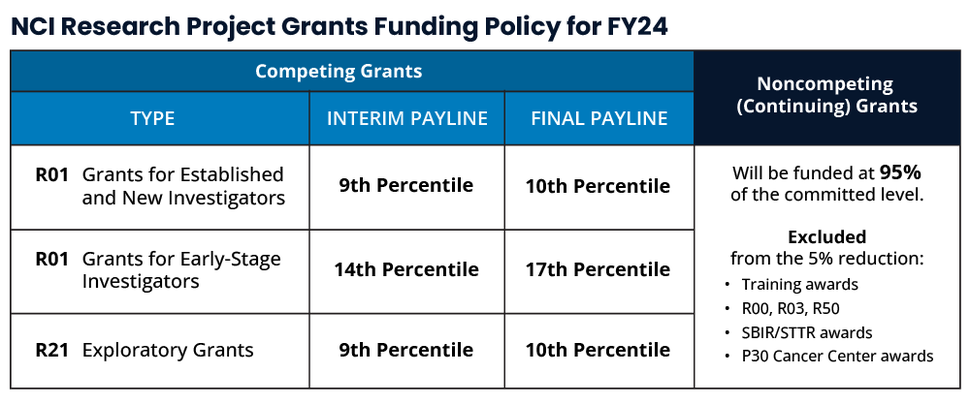Fiscal Year 2024 Appropriation Brings Clarity and Difficult Choices
, by NCI Director Dr. W. Kimryn Rathmell
NCI Director Dr. W. Kimryn Rathmell discusses NCI’s fiscal year 2024 appropriation from Congress, which increases the base budget but also reflects the end of dedicated funding for the Cancer MoonshotSM. The budget allows NCI to prioritize funding for new grants—particularly to early-stage investigators, training mechanisms, and Cancer Centers—while limiting the impact on continuing grants.
Following a series of continuing resolutions that stretched nearly halfway through the fiscal year, late last month Congress completed the fiscal year 2024 (FY24) appropriations process, passing the second and final batch of bills that included funding for the National Institutes of Health and NCI. President Biden signed the legislation into law on March 23, providing funding through September 30, 2024. The final appropriation provides NCI with a clear financial picture for the balance of the fiscal year and enables us to set funding policies for NCI’s grants and cooperative agreements.
The final funding bill, the Further Consolidated Appropriations Act, 2024 (H.R. 2882), provides NCI with a total appropriation of $7.22 billion. This is $96 million less than NCI’s FY23 total enacted budget (which included $216 million for the 7th and final year of Cancer MoonshotSM funding through the 21st Century Cures Act)—but an increase of $120 million compared with the base budget for FY23. Given that appropriators had to adhere to strict budget caps imposed by the 2023 Fiscal Responsibility Act, the increase to NCI’s base budget is notable—and a reassuring indicator of continued support for cancer research.
That said, this increase is smaller than NCI’s base budget increase from FY22 to FY23 and must be considered alongside NCI’s ongoing financial commitments, including continued advancement of research started with the Cancer Moonshot and rising costs of biomedical research. To learn more about these budget constraints, see NCI's Bottom Line blog from November 15, 2023.
Nearly 4 months into the NCI director position, my experience as an R01-funded investigator is still fresh, and I am keenly aware of the challenges that researchers across the community are facing. The FY24 funding policies described below represent decisions made after careful analysis to balance resource needs across the entire portfolio. This includes allowing NCI to prioritize funding for new grant awards, particularly to early-stage investigators; preserving support for training; and sustaining funding for Cancer Centers, among other priorities.
In October 2023, when NCI began the new fiscal year with temporary funding, we set conservative interim grant paylines while we waited for final action on a full-year budget. Now that we have our FY24 appropriation, we can now set the payline for competing R01 and R21 grants to established and new investigators at the 10th percentile. This is some improvement on the interim level (9th percentile), but we understand that it is still disappointingly low. Rest assured that we are working to support our extramural community, and we are committed to year-over-year growth in our portfolio.
We acutely recognize the challenge for early-stage investigators. The payline for these first-time awards is traditionally 5 percentiles above the standard payline. In this instance, we elected to retain the FY23 payline of the 17th percentile. This reflects an increase from the interim payline of the 14th percentile. This increase, coupled with prioritizing funding for training, reflects NCI’s commitment to developing and supporting researchers in the early stages of their careers to help ensure that we build and sustain the next generation of the cancer research workforce.
The FY24 paylines will enable us to fund outstanding cancer science. However, making these commitments to new, competing grants, while also managing rising operating costs in an era of high inflation, means that we must find cost savings. Therefore, NCI will pay most continuing, noncompeting grants—that is, years 2 through 5 of a typical 5-year grant—at 95% of the committed level, an improvement on the interim policy of 90%. Find more details about our funding policy from NCI's Division of Extramural Activities.
NCI program officers are the best sources of information for inquiries about individual applications, so please email them with questions on the potential impact of these updates on your research plans.
We are also making cuts internally and starting to plan for FY25, understanding that Congress will be navigating budget caps again in the next fiscal year. Our goal is to minimize the turbulence of the current funding climate.
Despite the fiscal challenges, we have so much to be optimistic about. The scientific opportunities before us have never been greater. The fiscal realities we face can provide an opportunity to ask hard questions about our priorities and consider new approaches and new partners. The National Cancer Plan, released a year ago this week, has proven to be a valuable tool—not only for NCI, but for the entire cancer community. The plan provides a roadmap for our activities to achieve the progress that we all want and that people with cancer deserve.
The bottom line: NCI’s FY24 appropriation from Congress increases the base budget, but also reflects the end of dedicated funding for the Cancer Moonshot. With the funding provided, NCI has been able to set policies that prioritize funding for new grants—particularly for early-stage investigators, training mechanisms, and Cancer Centers—and limit the impact to continuing grants.

